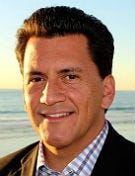Top Gun 51 Profile: Viasat's Eric Stark on Overcoming Challenges, Helping Partners
Many years of direct sales and a stint in government work prepared Stark for his work with the channel.
November 4, 2019

By Todd R. Weiss
As global satellite communications company Viasat began planning an expansion of its satellite internet business in 2015, it brought in Eric Stark as its national sales manager. Stark, who has been involved in telecom and the channel since the early 2000s, quickly grabbed the reins and now leads Viasat’s channel operations as the company’s director of sales for global business solutions.
“The company was looking for someone with experience in B2B sales and the channel and I checked off both boxes,” he told Channel Partners. “Viasat was looking to grow the channel. At the time, the satellite business was no stranger to indirect channel sales. As a company, we’ve always understood the value of the channel. That’s the value I’ve brought to Viasat.”

Viasat’s Eric Stark
Stark, who was recently named as a Channel Partners Top Gun 51 Award winner, spoke with Channel Partners about his work in helping to drive an increased channel community and presence at Viasat. The Top Gun 51 awards recognize a new generation of channel executives who are building and executing programs in a way that drives partner, customer and supplier success. Here is an edited version of that conversation.
Channel Partners: When and how did you get started working in the channel?
Eric Stark: My background has been in telecom for my whole career. From 1993-2004, I was working for AT&T mostly doing direct sales. That’s really how I first got introduced to the channel. I was selling network services, starting off with voice and then data, frame relay and more. Then I left AT&T and spent four years in the George W. Bush administration doing policy work, giving the president advice on telecommunications and the internet.
We recently unveiled our “Top Gun 51,” a list of today’s channel executives who deserve recognition for building and executing programs in a way that drives partner, customer and supplier success. |
CP: What is Viasat’s approach to the channel?
ES: We have about eight master agents that we work with, and a number of those have consortia to reach more partners. The master agents give us access to a far larger number of agent partners — maybe 10,000 through them as distributors of telecom products and services. And with all of them the common denominator is a fundamental understanding that the channel, and our indirect sales partners are incredibly important to us. That’s the way I and my team approach it every day. We are very focused to make sure that everything we do is meeting their needs. That picture is not focused on what we can deliver, but really on what we’ve heard from our partners about what their customers need.
CP: What is a challenge facing Viasat in the satellite communications business today?
ES: My biggest competition is the bad rap that satellite service has had for people who have had a bad experience with it in the last 10 years. That’s our greatest challenge. The company that we are really got its start in residential service. Viasat got into the business of satellite internet when it bought Wild Blue Communications in 2010, which had pioneered satellite broadband to homes across the nation and had some 500,000 customers. When I came in four years ago, the mission was to do that same thing but for business customers. There are lots of business customers in rural areas, sure, but in suburban and urban areas there are also plenty of business customers who have very slow internet service. We want to provide …
… faster service to help them.
CP: What are your thoughts about the future of the channel?
ES: What I see is that the channel is strong and what we’re seeing in the channel are some changes in technology, including things like hardware deployments changing into hardware-as-a-service offerings. That’s just going to continue. The cloud is becoming more and more prevalent and having more services. That model is continuing to grow. Where I see the changes happening in the channel, they are technology changes that are driving what’s being sold in the channel. Back in the day it was voice services being sold in the channel, and now what we are seeing are technologies such as SD-WAN and unified communications as a service, which is more comprehensive than VoIP. That monthly recurring revenue business model seems like it is here to stay. There are more of those kinds of services for business to buy and the channel is going to be there to make that available to their business customers.
CP: What were your thoughts about being named as one of the Channel Partners Top Gun 51 award winners?
ES: Being in that room with the folks who were recognized that night, it was a group of people I was very humbled to be a part of.
Read more about:
AgentsYou May Also Like
